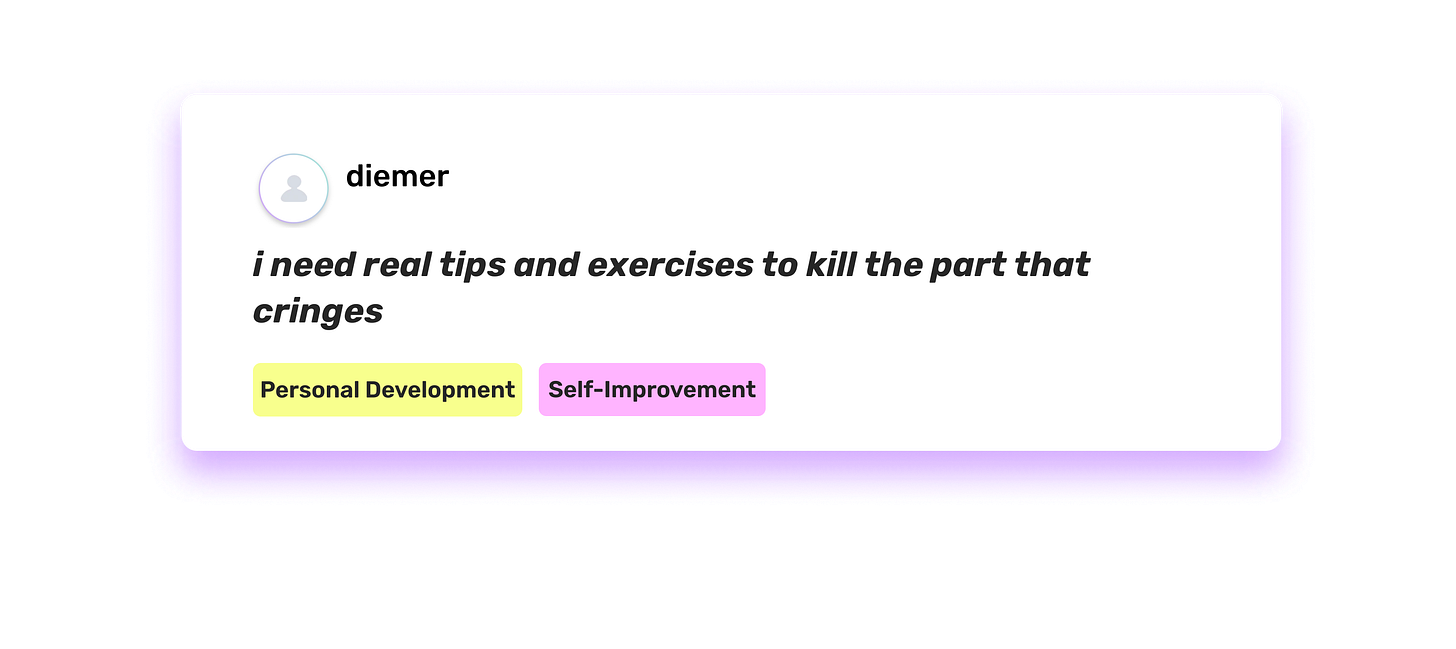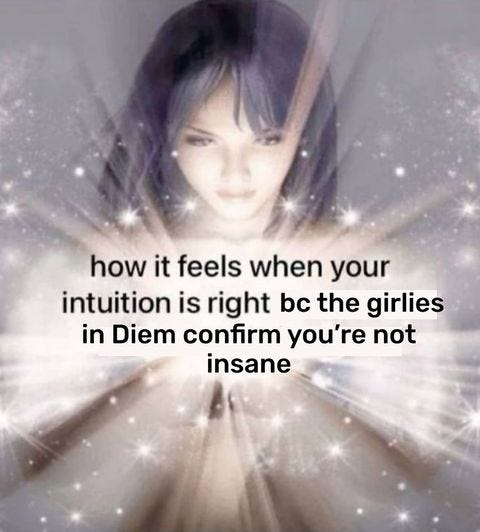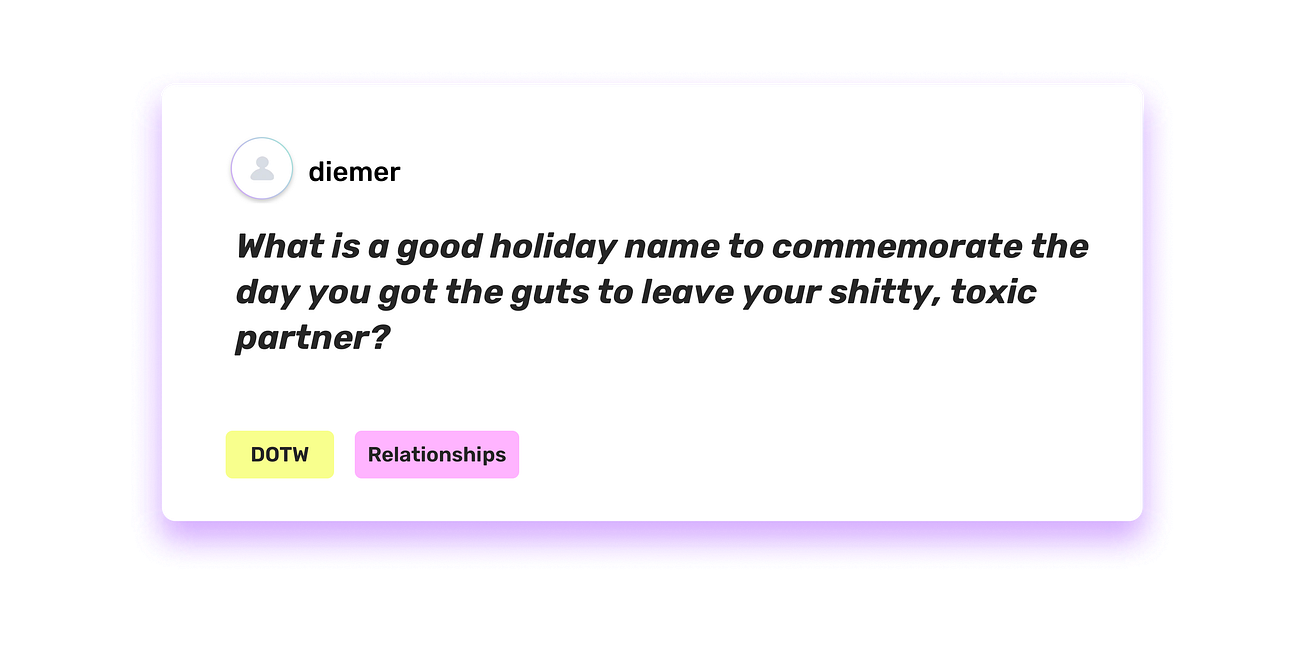How can I kill the part of me that cringes?
Whatever creative field or stage of life you’re existing in, cringe is inevitable.
Today’s newsletter is about an insecurity that plagues not just creatives, but anyone living their life online.
But first, here’s what else people are talking about on Diem:
In 2020, despite having bigger things to worry about, the internet invented a new, damning infraction: being cringe. While communities like Reddit’s r/Cringe had existed for some time, it was arguably TikTok that turned the word from objective adjective to debilitating insult. To be cringe online is to post painfully earnestly, while being unaware of how you are coming across. Someone filming an off-key song cover, for example, is cringe. Ironically, most TikToks in 2020 are probably cringe now, too. But cringe is also necessary to create.
Back before social media, budding artists were cringe in private. Nobody saw Georgia O'Keeffe’s first attempt at a painting or Virginia Woolf’s first time writing a story, because life was lived entirely within their small, IRL communities. Even growing up on early social media, as I did, means my first writing is shielded from the kind of public scrutiny apps like Twitter, Instagram, and TikTok demand today. It was FanFiction.net where I first flexed my writing muscles, and even my first full-time writing job was at a website that doesn’t really exist anymore. If you go back and read any of that writing, though, there’s only one word to describe it: cringe. I was young, I was experimenting, but while it didn’t feel like it at the time, I was laying the crucial groundwork that would allow me to feel more confident in myself as a writer ten years later.
This is why cringe, while an uncomfortable feeling that makes me want to wipe all evidence of my early self from the face of the earth, is so important. You have to start somewhere to get better, otherwise you won’t start at all. To demand to live a life without ever making yourself or others cringe is to ask to come out of the womb a fully finished person, one born with talent so embedded in your DNA, you’re writing great American novels or singing full operas without any practice. It’s not just unrealistic, it’s ridiculous—which is why the demonization of “cringe” is such a shame.
The Atlantic writer Kaitlyn Tiffany wrote about the progression of cringe in 2022:
As cringe culture was blowing up online, the entertainment industry embraced cringe comedy and realized the cringe promise of reality television. This made the trappings of cringe even more familiar, while the act of calling out cringe—as opposed to simply feeling it—became something of a reflex. In 2018, the same year that Dahl’s book on cringe was published, several popular image macros were created specifically for this purpose, including one of the cartoon character Shrek snapping a photo, captioned yep. this one’s going in my cringe collection. (Sorry, I know explaining this is also cringe.) Soon, there were Instagram compilation accounts dedicated to collecting the worst cringe, with a focus on cringe created by not-quite-random people who were performing, and failing, for thousands of their peers on TikTok.
Fear of not immediately producing something perfect is perhaps the single biggest mental block plaguing modern creatives. I find it impossible to write without having to push through a particular kind of self-judgment, one that attempts to anticipate all the ways other people might feel negatively about my work, because I’ve become so conditioned to sharing it. I’ve spent years trying all kinds of techniques to stop this internal battle from happening, from meditation to fancy writing software, only to come to a conclusion you might not want to hear: You can’t kill the part of you that cringes.
While other people may have successfully done it, trying to do so myself means being at such constant war with my own thoughts that I don’t get any writing done, anyways. Whatever creative field or stage of life you’re existing in, cringe is inevitable. “No matter how hard you try to avoid being cringe, you will look back on your life and cringe retrospectively,” Taylor Swift said at her New York University commencement speech in 2022. “Cringe is unavoidable over a lifetime. Even the term cringe might someday be deemed cringe.”
If cringe is inevitable, then we have to think about what comes after. Someone thinks you’re cringe—and then what? You go to jail? Or do you just…keep living your life, seeing your friends, spending time with family, growing and changing and creating? The fear of cringe is so significant that it renders being cringe wholly anticlimactic. It’s also unfounded, because there’s another fact I know is true: Nobody else is really thinking about you at all.
In other words, cringe is self-inflicted. While of course your friends and family think about you and love you, no one lives their life thinking about other people’s day-to-day fashion choices, hobbies, or personal creative endeavors. When my friend once asked if the new hairstyle she tried at a recent party looked weird, I had to admit the unflattering truth: I was too busy thinking about my hair to remember her hair at all. Get the bangs, post the outfit, sing the song. Do it like no one’s watching, because they’re probably not—and isn’t that so freeing?
Instead of killing your cringe, try to challenge it. What are these feelings telling you? What about what you’re doing is making you uncomfortable? Will pushing through the discomfort allow you to grow, or is what you’re feeling a warning you should actually heed, that perhaps you’re doing something inauthentic or that goes against your values?
And remember that despite the pressures of social media, we don’t have to create in public if we don’t feel ready. In fact, I can’t think of a worse idea than posting your first-ever guitar riff or make-up look for a bunch of strangers with no context of you or your work to judge online. Their opinions have zero relevance to your journey, anyways. Instead, if you’re looking for feedback, take your work to people you trust, be they in real life or smaller communities online where you won’t end up on the wrong side of the algorithm. Oh hey—I think there’s an uplifting, fun, supportive app for that!
Have you killed the part of you that cringes? How do you navigate creating in public? Let’s chat on Diem.
ICYMI
Barbie Vaginas and Back Shots
Welcome to The Briefing, a roundup of the best of girl internet (AKA Diem) this week. You’re receiving this because you’re subscribed to The Things We Don’t Talk About. If you’d like to opt-out of The Briefing, head here. Forwarded this email? Subscribe now for the best of Diem every Tuesday and Friday.
Before you go…
The latest version of Diem is now available — update on iOS, web, and Android!




